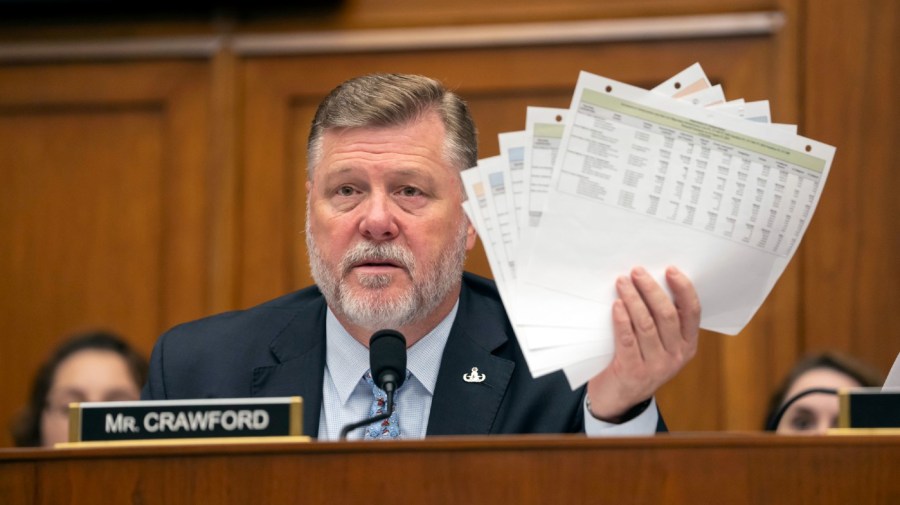
In choosing Rep. Rick Crawford (R-Ark.) to chair the House Intelligence Committee, Speaker Mike Johnson (R-La.) has tapped a veteran conservative with “America-First” leanings to steer one of the most powerful panels heading into the second Trump administration.
Crawford, a 14-year veteran of Capitol Hill, voted last year against legislation providing billions of dollars in aid to Ukraine, citing more dire needs at home. The vote aligns him with Trump and his allies, who have sought to shift U.S. resources away from foreign entanglements and dedicate those energies instead toward domestic economic problems.
Crawford also voted in 2021 to challenge the presidential election results in both Pennsylvania and Arizona, where Trump was defeated but nonetheless claimed victory.
Both of those positions — Ukraine and the 2020 election — mark a sharp contrast to the track record of Rep. Mike Turner, the Ohio Republican who chaired the Intelligence Committee in the last Congress but now finds himself without a gavel.
Turner, now in his 23rd year in Congress, fits the more traditional mold of Reagan-era conservatism, including support for extending government surveillance powers, maintaining strong ties with NATO allies and helping Ukraine repel Russia’s invasion. Those positions have put him at odds with Trump’s “America First” agenda and made him a target of some of the incoming president’s MAGA followers.
Turner was also among the minority of House Republicans who voted to certify Joe Biden’s victory in Pennsylvania and Arizona four years ago.
Johnson, who has unilateral power to appoint the Intel chair, has defended his decision to remove Turner’s gavel, rejecting the notion that it came as a result of pressure to appease the incoming president.
“This is not a Mar-a-Lago or a Trump decision, this is a Speaker’s decision,” Johnson told reporters Thursday in the Capitol.
“A lot of deliberative thought goes into these things,” he continued. “The Intel Committee is extremely important, especially at a time like this, and it’s time for a new start.”
Johnson has suggested that his decision was motivated, at least in part, by an episode last year when Turner warned of a dire threat to U.S. security — an incident that appeared to catch Johnson off guard.
“There’s been a lot of controversy, as everyone knows, about things related to the Intelligence Committee … and abuses and things and lots of allegations over the last few years,” Johnson said. “We’ve got to clean all that up.”
But the removal of Turner has also sparked a backlash from Democrats — and at least a few Republicans — who are accusing Johnson of bowing to Trump’s wishes at the expense of national security. Those voices have long criticized Trump for being too cozy with Russian President Vladimir Putin, and saw Turner as an ally in the effort to push back against Moscow’s aggression in Ukraine and beyond.
“Mike Turner has robustly promoted the safety of the American people and the Free World and his unjustified ouster is likely being applauded by our adversaries in Russia and China,” House Minority Leader Hakeem Jeffries (D-N.Y.) said Thursday in a statement.
“Shameful.”
Crawford, who voted last April against almost $61 billion in aid to Ukraine, said he supported Ukraine’s effort to expel Putin’s “invasion force,” but could not endorse non-military aid to Kyiv “when Americans are struggling with rising costs at home.”
On other issues related to the Intel Committee, however, Crawford has sided with Turner, even when other House conservatives were calling for a different approach.
Crawford, for instance, has supported renewal of a controversial law empowering the government to surveil the communications of foreigners when they are abroad. That law — Section 702 of the Foreign Intelligence Surveillance Act (FISA) — has long been criticized by conservatives on Capitol Hill who say it gives the government too much power to capture data from U.S. citizens.
Many of those critics are members of the House Freedom Caucus — and are among Trump’s staunchest supporters on Capitol Hill.












